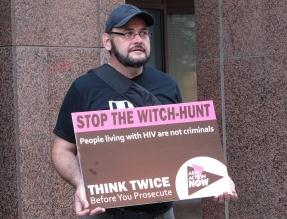Call it an inspiring history lesson.
The night started with a screening of a historical documentary but ended with a panel discussion calling for action on the contentious issue of HIV criminalization.
While there was much reminiscing on past activism at the AIDS Action Now presentation of United in Anger: A History of ACT UP at the AGO’s Jackman Hall Nov 27, members of the activist group have their sights set on the future.
Tim McCaskell, a founding member of AIDS Action Now — and former Body Politic contributor — addressed the October Supreme Court decision on HIV criminalization.
“This is trench warfare,” he said.
“This has been a really bad decision. It’s going to inordinately impact women and people living in isolated communities.”
The group distributed postcards to the audience as part of its Think Twice campaign. The campaign targets the Supreme Court of Canada decision that says HIV-positive people must disclose their status unless they are able to prove a “low viral load” and use a condom.
The postcards are directed at Ontario’s attorney general, John Gerretsen, and Crown prosecutors. Audience members were encouraged to fill out the postcards, to be hand-delivered to Gerretsen’s office.
The October decision was the first revision of the law since it was drafted in 1998. McCaskell expects it will be another decade before the issue reaches the courts again.
“This is going to be one of those long drawn-out fights,” he says.
The Toronto-based group, which celebrates its 25th anniversary this year, is no stranger to long fights. Fights that began in 1987 were the main focus Nov 27; the evening began with a screening of United in Anger by New York filmmaker and activist Jim Hubbard.
The documentary tells the story of a ACT UP, AIDS Action Now’s sister activist group in the United States. ACT UP started in New York City in 1987 during some of the most intense years of the epidemic; Hubbard used archival footage and recent interviews to explain the history of the movement.
Major protests featured in the film include demonstrations that called for the Food and Drug Administration to release medications. On-the-ground footage also shows a controversial “die-in” at St Patrick’s Cathedral in New York City. In it, ACT UP members lie down in the church’s aisles to protest the Catholic Church.
The film tells a story two decades old but one that can’t be forgotten, Hubbard says. He hopes his documentary can inspire new advocate groups to continue ACT UP and AIDS Action Now’s work.
“It’s intended as a blueprint for activism,” he said in a phone interview Nov 25. “That’s why sections on civil disobedience and affinity groups and on the art collectives and the footage of the planning meetings are all there — so you actually see what it’s like to organize.”
His sentiments were echoed by AIDS Action Now members who turned the focus from historical to current during a short question-and-answer period at the screening.
“People are still dying. People are dying internationally,” said member Zoe Dodd. “We can’t be apathetic. We still need AIDS Action Now; we still need to do activism.”
AIDS Action Now protest ahead of Supreme Court decision Feb 8, 2012.

 Why you can trust Xtra
Why you can trust Xtra


